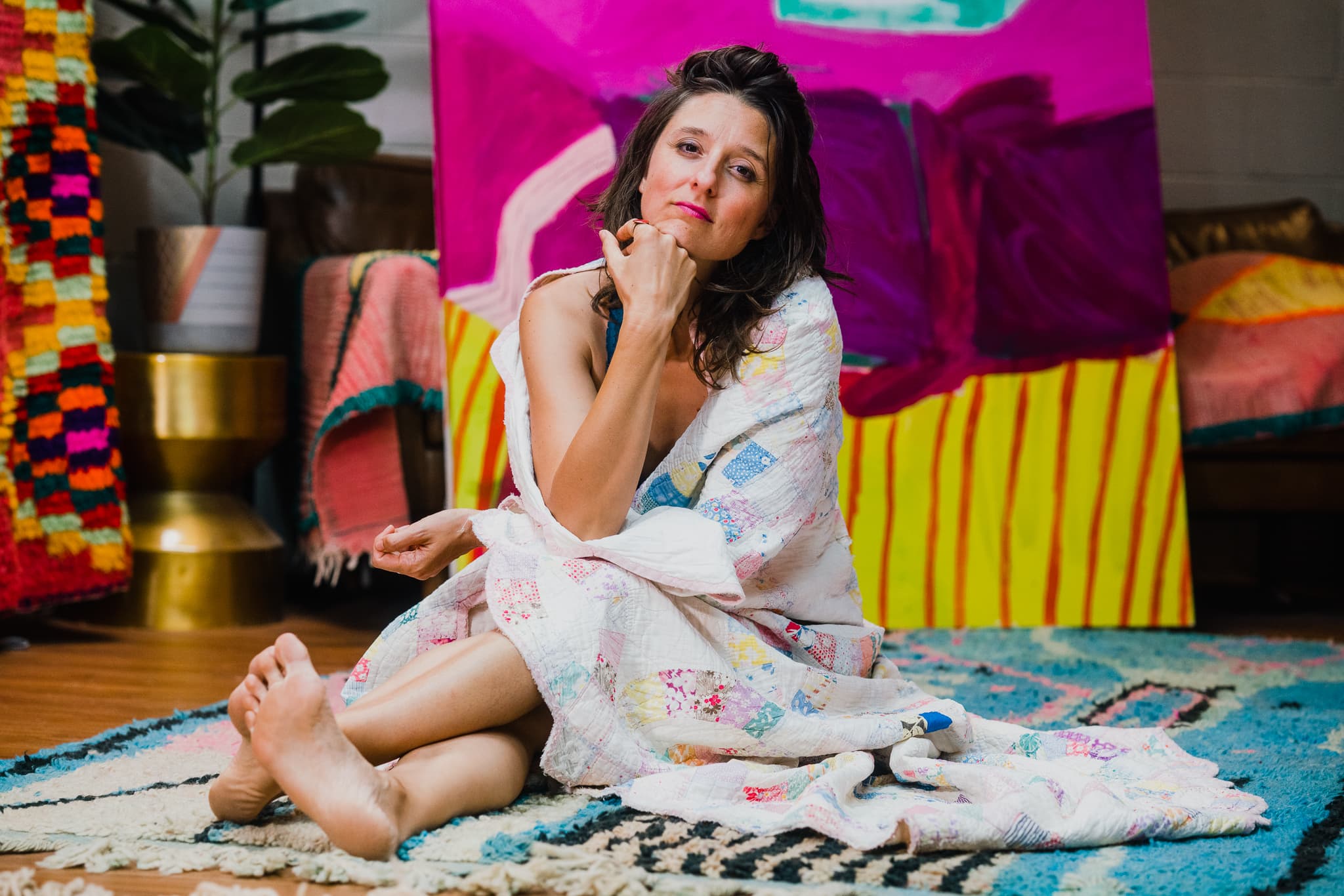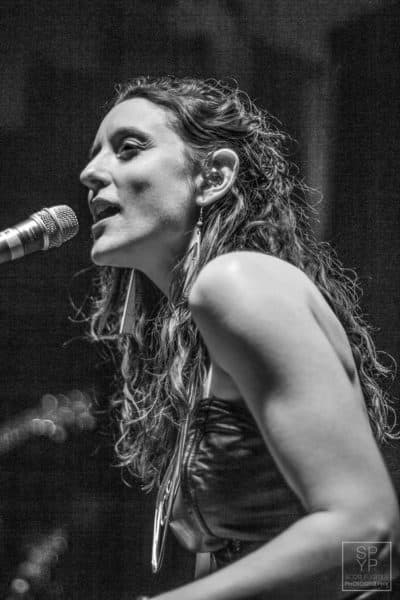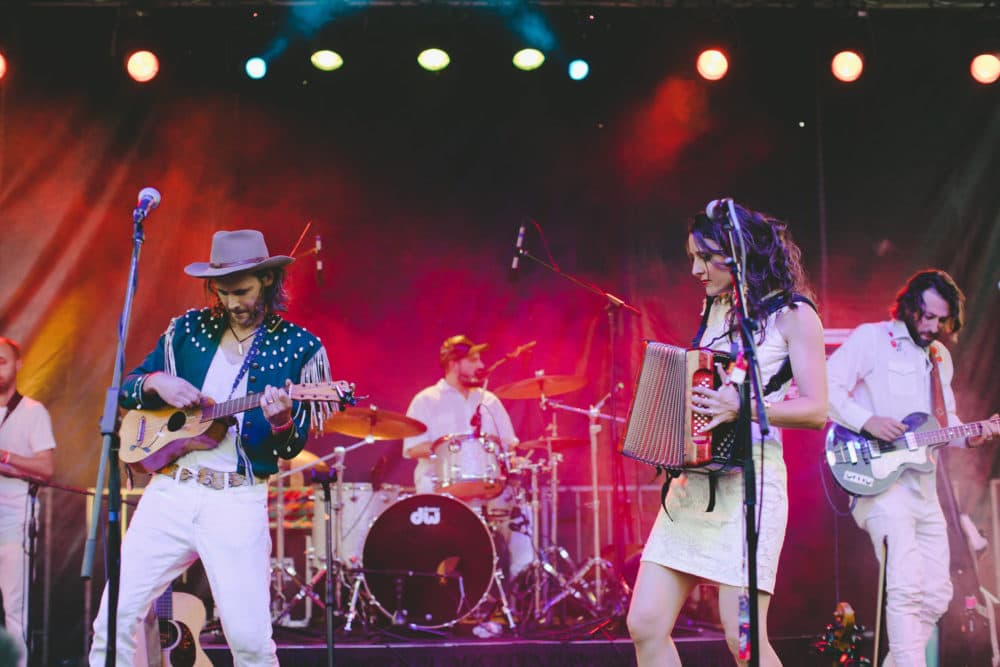Advertisement
David Wax Museum's Suz Slezak delivers her most personal songs yet

From a friend’s suicide to a traumatic childbirth, the songs off Suz Slezak’s new solo album “Our Wings May Be Featherless” feel intimate enough to be diary entries, while hitting a universal nerve of human emotion.
Slezak is one half of Boston-grown Mexo-Americana duo David Wax Museum. And you’ve never heard her open up like this.
A mother of two, her first solo album was a collection of lullabies. But in her sophomore solo release, the Wellesley alum works through a lifetime of hurdles: “Why Luke” is about a childhood friend who died by suicide. In “Take Me,” she writes of her traumatic 40-hour labor that ended in emergency C-section. "Beautiful Mess" deals with her journey navigating her bipolar disorder.
Writing these songs in her attic studio during lockdown, Slezak says, was “totally cathartic. Just to make something beautiful from those experiences that I carried around — to be able to turn them into art — is an incredible gift for me. It’s so healing to finally tell these stories and sing about them in the open.”
Slezak met David Wax, a Harvard alum, in Cambridge in 2007. They formed their band here before moving to her native Virginia in 2013. They’re now based in Charlottesville with their kids, Calliope, 8, and Moses, 4.
The new album drops March 4, just in time for David Wax Museum shows their old stomping grounds — the Narrows Center for the Arts in Fall River March 5 and City Winery Boston March 6. Both shows will see the husband-and-wife duo play a mini-set of Slezak’s new solo material.
In a phone interview, Slezak talks bipolar disorder, suicide, motherhood — and the band’s gig playing U.S. Transportation Secretary Pete Buttigieg’s wedding.
Lauren Daley: This is your first personal solo album — and it’s really personal. What sparked this?
Suz Slezak: Honestly, just having the time at home during the pandemic. We’d been touring like crazy for a decade, most of those years with one or two little kids in tow. I’ve been singing and supporting David’s songs for so many years…so it was amazing to sit down and try writing and see what came out. It was the first time I’d written so personally, like you said.
I’m interested in how you grew up — without TV and homeschooled until high school.
My parents were interested in the back-to-the-land movement of the ‘70s. I grew up on a farm down a dirt road. Free Union, Virginia would be the closest one-horse town.
My mom worked in a hospital and my dad home-schooled us and milked the jersey cow every day. It felt normal [until] I came out into the world of ‘80s music and pop culture and realized I had no clue what was going on.

It was you and your two brothers. What was your day-to-day life like?
We woke up when we woke up — we didn’t have to set an alarm clock. We did a math lesson in the morning, music lessons on both instruments — mine were violin and piano. We did a lot of singing.
My dad’s interested in all kinds of things — languages, politics, nature, farming. His enthusiasm rubbed off on us. He’d read to us for hours, incorporate all the things he loved into our day-to-day life. But the afternoons were always just for play and being outside.
You write about your friend Luke who committed suicide — was he a boyfriend?
He would joke with me about wanting to be my boyfriend, and marrying me one day. That was part of our friendship and flirtation. But we never officially dated. Only in my dreams. [laughs]
It feels like Luke’s death was a defining moment in your adolescence.
Yeah, it was the first total life-blow. The most intense grief I’ve probably ever felt, but especially as a kid. It’s really colored the way I’ve gone on my own mental health journey, because I see that’s a possible end-point. I’ve spent my whole adult life trying to understand what suicide is and how it can happen.
Now that I’ve been on mood-stabilizers, I’m so grateful for what they do to my brain. People are scared of taking psychiatric drugs, but to me, it’s not normal to have a brain that doesn’t want to live. I’m trying to switch thinking about medicines as this chemical toxic pollutant and instead just accepting: my brain does this unnatural thing, which is sometimes to get really slow, and sometimes to get super fast and totally off the deep-end in mania.
Suicide is so confusing and so scary, and part of that is we have this way of looking at physical diseases — because there are blood tests for them — but because mental illness is often so secret and able to be masked.
Advertisement
I went on my own mental health journey and now have seen first-hand this experience of having a bipolar brain. It’s an illness just like cancer.
You were first diagnosed as bipolar at 24.
Yeah, I went to Wellesley College, majored in anthropology, then traveled around the world on a Watson Fellowship. I studied spinning and weaving of natural fibers. I went to Guatemala, New Zealand, India and Thailand. My brain was cycling then, but I called it homesickness, I called it excitement about travel, I called it loneliness.
Then I got home from that trip and really crashed. I was cycling the next year, then had months of mania followed by months of serious depression. I couldn’t keep a job, I couldn’t pay rent. I was taken back home to my parents’ place, which of course, at 24, feels horrible. I couldn’t do the basics of being an adult. My parents took me to a psychiatrist and she diagnosed it right off the bat.
It was traumatizing to have a doctor say, "You have to be on lithium for the rest of your life. It’s toxic if you take too much, so you have to get your blood tested every three weeks. You can’t have kids; you can’t breastfeed. You can’t drink caffeine or alcohol.”
But I looked at all the symptoms, and I could check off every box. I had to accept it. But I felt so embarrassed talking to people about it. Or dating — when do you tell them? I remember when I told David I was bipolar, he said: “I take pills for my acid reflux, you take pills for something else. Who cares?”
That’s awesome.
I feel like that was really profound, because we put psychiatric drugs in this other category. But it’s dangerous to put them in other categories.

What prompted you to move back to Boston in 2006?
I knew I needed to get out of town and wanted to be somewhere familiar, but different. The career center at Wellesley helped me land this job, coincidently, at McLean Hospital in their development office. I was writing these letters on behalf of my boss: “Let’s end the stigma around psychiatric illness! Donate to McLean!” But I was still hiding my bipolar disorder and didn’t tell anyone in my office. I would sneak away on lunch break and participate in studies. They had posters hanging: “Do you have bipolar disorder? Call this number!” so I’d sneakily call, and get paid $25 an hour to be in the study.
Wow, that’s so ironic.
Right? The other funny story: they were studying the mitochondria of people with bipolar disorder, so I sold a little chunk of my body. I sold a little chunk of my bottom for $75. For science. And, of course, I knew the doctor taking the sample because I worked at the hospital. “Oh, Dr. So-and-So — it’s you!” [laughs]
[laughs] That’s great. And how long did you work there?
Three years. Meanwhile, I was performing in bands. I met David in 2007, we started our band. We soon fell in love and never looked back.
How did you meet?
I was gigging with old-time and bluegrass bands in Boston. He just got back from Mexico and was asking around for musicians to play with him. A mutual friend introduced us. David hosted his own house party in Cambridge because he couldn’t get a gig anywhere else, and I showed up at his living room to hear his show. We met in the doorway. He wanted to start playing together, he was desperate for musicians. We were doing weekend gigs pretty early on.
You guys have two kids. But you were told that you couldn’t have kids.
You can’t have kids on lithium. When I got to Boston, I found a new psychiatrist, he weaned me off lithium. I was off it for eight years. I had two kids, breastfed them. When my youngest was 1, I was really cycling again. And, of course, I had been cycling all those eight years, but I explained it away with the buzz of touring, the exhaustion of pregnancy.
But then I realized “I need help. I’ve been fooling myself that I didn’t have to deal with this.” That was four years ago, and it’s been four years of trying out different medications, different doses. It’s such a journey, and you’re a guinea pig for your own healing.
Your song “Take Me” was about a traumatic birth.
I wanted a natural birth at home. And then 30 or 40 hours in, we realized the baby’s not coming out. Having to transfer to the hospital for an emergency C-section felt so shocking. It’s hard on the body to go through a complete labor then a c-section. To be on a surgery table, my arms strapped down, my body’s convulsing — it’s so scary.
And then to think your second birth will be easier, but it wasn’t. It was devastating both times. I felt totally wrecked. I can’t do it again.
I need to ask you about this: you played Pete Buttigieg’s wedding in 2018.
David’s an old friend of Pete’s from high school. They met at a U.S. Senate youth program, then they went to Harvard together, and stayed in touch. We’ve stayed with them every time we’ve been on tour in the Midwest; we played a concert at his house. So he asked us to play his wedding, and it was in the thick of me getting back on medication, but I was determined: “We’ve got to play Pete’s wedding, this is so important.” His husband Chasten asked me to sing Alison Krauss’ song for their wedding dance, “When You Say Nothing At All.”
Wow.
Sometime around then, we were staying with them and we went downstairs for breakfast, and Pete walked in with bagels and said, "So Dave, Suz — do you think I should run for president?"
We were like, "What kind of breakfast conversation is that? Who says that?" [Laughs] I let David answer that one.
What did David say?
He went through the pros and cons, and said: “Yeah. What have you got to lose?”
This interview has been edited and condensed for clarity.
Resources: You can reach the National Suicide Prevention Lifeline at 1-800-273-TALK (8255) and the Samaritans Statewide Hotline (call or text) at 1-877-870-HOPE (4673). Call2Talk can be accessed by calling Massachusetts 211 or 508-532-2255 (or text c2t to 741741).


